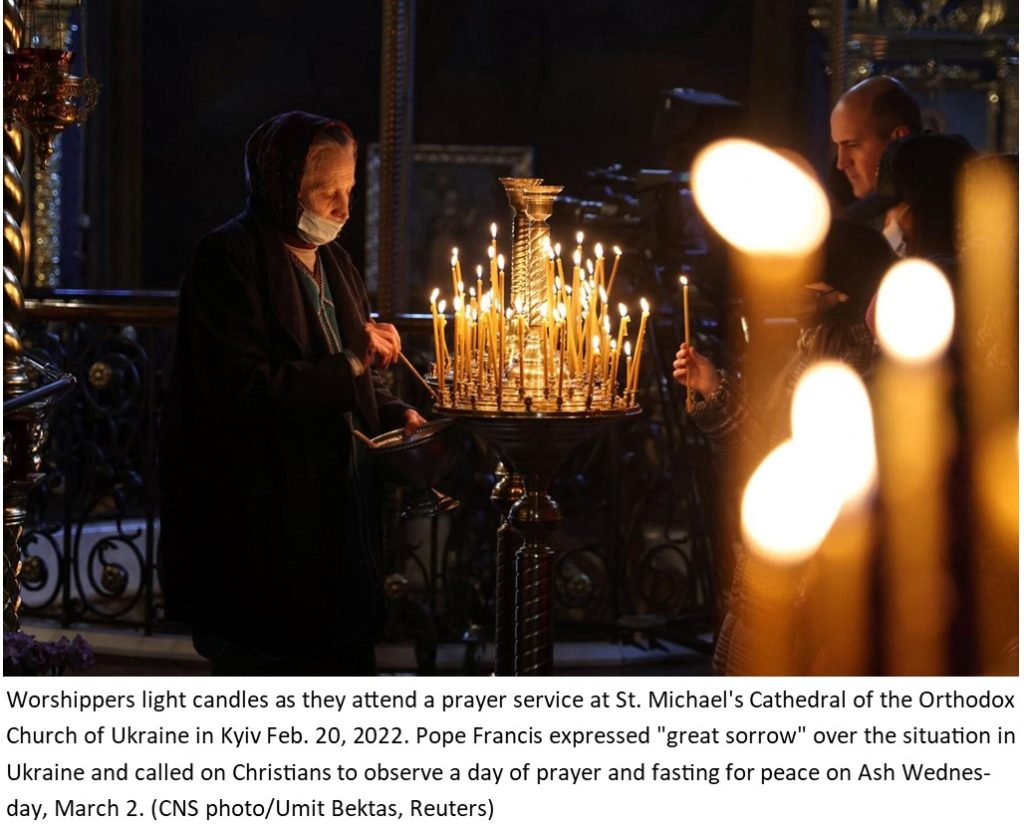Ashes of death on our foreheads,
seeds of hope in our hearts.
As we begin the journey, beyond the cross,
let us remember,
God prepares us for life, not for death,
for resurrection and not for crucifixion,
for love and not for hate.
In a world where death holds us bound, and violence seems to reign
in thought and deed,
may this journey of Lent get us ready
to be God’s good news
of hope and wholeness,
peace and reconciliation,
and resurrection life.
Christine Sine
Ash Wednesday
Ash Wednesday
Ashes of death on our foreheads,
seeds of hope in our hearts.
As we begin the journey, beyond the cross,
let us remember,
God prepares us for life, not for death,
for resurrection and not for crucifixion,
for love and not for hate.
In a world where death holds us bound, and violence seems to reign
in thought and deed,
may this journey of Lent get us ready
to be God’s good news
of hope and wholeness,
peace and reconciliation,
and resurrection life.
Christine Sine
Pope calls prayers and fasting
Pope calls for day of prayer, fasting
for peace in Ukraine
S. Lynn McKenzie, CIB moderator writes: “There are Benedictine nuns and sisters in Ukraine who need our prayers. I heard from the CIB Delegate of CIB Region 7 which includes Poland, Ukraine and Lithuania – she has been in touch with the abbess of the monastery of nuns in Zhytomyr Ukraine who said that the military base near them was destroyed by shelling last night. Some people in the area are coming to the abbey of the nuns to take refuge. I’m afraid that this will spill beyond Ukraine borders.”
VATICAN CITY | As the threat of war loomed over the world, Pope Francis called on people to pray and fast for peace in Ukraine on Ash Wednesday.
Before concluding his general audience Feb. 23, the pope called on believers and nonbelievers to combat the “diabolical insistence, the diabolical senselessness of violence” with prayer and fasting.
“I invite everyone to make March 2, Ash Wednesday, a day of fasting for peace,” he said. “I encourage believers in a special way to devote themselves intensely to prayer and fasting on that day. May the Queen of Peace protect the world from the folly of war.”
In his appeal, the pope said he, like many around the world, felt “anguish and concern” after Russian President Vladimir Putin recognized the independence of the eastern Ukrainian regions of Donetsk and Luhansk.
The pope said that due to the “alarming” developments in the region, “once again, the peace of all is threatened by partisan interests.”
“I would like to appeal to those with political responsibilities to do a serious examination of conscience before God, who is the God of peace and not of war, who is the father of all and not only of some, who wants us to be brothers and sisters and not enemies,” he said.
He also urged world leaders to “refrain from any action that would cause even more suffering to the people, destabilizing the coexistence between nations and discrediting international law.”
Putin’s recognition of the two breakaway regions’ independence was seen by Western leaders as a violation of international law protecting Ukraine’s territorial integrity and as a move that could pave the way for a Russian invasion of eastern Ukraine.
In the wake of the Russian president’s actions, the United States, the United Kingdom and the European Union announced sanctions against several Russian banks and institutions.
In a statement released Feb. 22, Archbishop Sviatoslav Shevchuk of Kyiv-Halych, head of the Ukrainian Catholic Church, said Putin’s recognition of the Donetsk and Luhansk regions has caused “irreparable damage” to the “logic of international relations.”
He also said the Russian president “destroyed foundational principles for a long-term process of restoring peace in Ukraine” and “created the path for a new wave of military aggression against our state.”
~Article by Catholic News Service posted on Florida Catholic Media
February 23,2022
Continue ReadingMade Whole…
We each have our own variant of leprosy, don’t we? With some it’s visible on the outside; for others it thrives on the inside. Our faults: scaly, obvious by our actions, our facial expressions. And, there are those who harbor their leprosy – deep in their feelings and heart – a gut ache or pain caused by stressed nerves. Whether or not we raise our voice to be heard above the crowd: “If you wish, you can make me clean.” Or, it may be, that someone pushes us forward, “now’s a good time; ask him now – He can do it!” Do you believe in intercessory prayer? Do the General Intercessions make any difference in the lives of those we name? In God-time, yesterday, today, years ago all blend into the eternal NOW.
Yes, even when our leprosy is old and scarred and has been in our gunny sack for more years than we can to count. You know the kinds of wounds that we take out every once in a while to nurse and keep alive. We rehash their story privately or in unrelated situations when some word or sound, or maybe a smell relights the fuse. The ember that springs to flame that we didn’t even realize was there all along. But Jesus has been watching it. And, He’s waiting for us to reach out and plead: “If you wish, you can make me clean.”
When we do, what is Jesus’ instruction? “Go, show yourself to the priest.” (Here he’s not talking about the Sacrament of Reconciliation.) This was Jesus’ way of asking us to bring our faults into the light of day. To expose them so they can be zapped with the Divine Presence. St. Benedict, in the very first sentence (following the Prologue of His Rule) calls his followers, who’ve chosen what he considers “the better way” – the cenobitical (the monastic) way of life under a Rule and a superior. Here and other places in the Rule, he speaks of submission to the will of another, humility, confession of faults and public admission of mistakes. He quotes the psalmist – as he often does – when he says: “I will report my faults to the Lord.” (PS 31). He speaks of taking the last place at table, what we used to term “kneeling out”’ or being set apart from the rest of the community. Isn’t that all a pretty “public” admission of fault. Benedict actually says: “that they may be seen by all until they do penance by public satisfaction.”
Benedict encourages the members to admit their fault “of their own accord and make satisfaction.” But he’s not  naïve – he knows there will be occasions when this doesn’t happen. You know what he says: “be subjected to a more severe correction.” Now that may seem irrelevant to the story of Jesus and the man with leprosy. But it seems pretty obvious that Jesus did not go looking for the man. The man called out to Jesus: “If you wish, you can make me clean.” Benedict, (what a wise man!) he knew there’d more sensitive souls in community. Personalities who’d need more solicitous care, compassion and consideration. To this one, Benedict advises: “reveal” (this hidden fault) “only to a spiritual guide who knows how to heal her own wounds as well as those of others,” (and equally important) “without exposing them and making them public.”
naïve – he knows there will be occasions when this doesn’t happen. You know what he says: “be subjected to a more severe correction.” Now that may seem irrelevant to the story of Jesus and the man with leprosy. But it seems pretty obvious that Jesus did not go looking for the man. The man called out to Jesus: “If you wish, you can make me clean.” Benedict, (what a wise man!) he knew there’d more sensitive souls in community. Personalities who’d need more solicitous care, compassion and consideration. To this one, Benedict advises: “reveal” (this hidden fault) “only to a spiritual guide who knows how to heal her own wounds as well as those of others,” (and equally important) “without exposing them and making them public.”
We don’t know how long this man with the leprosy had been following Jesus. How many miracles had he witnessed before he felt compelled to step forward and let the words escape his lips: “If you wish, you can make me clean”? Had he seen Jesus’ interaction with the woman caught in adultery or heard the story of the good Samaritan or good Shepherd? Was it desperation that made him cry out: “If you wish, you can make me clean”? Was he burdened with feelings of guilt for having leprosy and causing the estrangement of his family and friends since he was bound by law to “make his abode outside the camp”? (Leviticus1:46) Did the rest of the crowd step back when he moved forward to be heard? This was a “gutsy” young man … stepping into the light, drawing attention to himself and his leprosy. Admitting publicly, he was not clean. He risked being shunned AGAIN! But faith won out: “If YOU wish, YOU can make ME clean.”
As we enter the Lenten season (this week), we pray: “Jesus, if you choose, you can make me clean.” I do want to be clean. I’m ready to be made whole. Don’t look only at the faults I am aware of. I trust that you can make the whole of me clean in your eyes. But, Lord, to tell no one? That’s hard. I beg you, don’t expect me to keep my lips closed against the sentiment in the Responsorial Psalm and the Gospel Acclamation: “I turn to you, Lord, in time of trouble, and you fill me with the joy of salvation. … for, a great prophet has arisen in our midst: God has visited his people.”
clean. I’m ready to be made whole. Don’t look only at the faults I am aware of. I trust that you can make the whole of me clean in your eyes. But, Lord, to tell no one? That’s hard. I beg you, don’t expect me to keep my lips closed against the sentiment in the Responsorial Psalm and the Gospel Acclamation: “I turn to you, Lord, in time of trouble, and you fill me with the joy of salvation. … for, a great prophet has arisen in our midst: God has visited his people.”
May you have a blessed Lenten experience beginning with Ash Wednesday…. Could be you’ll have to sport “imaginary” ashes if you’re parish has limited attendance at services … plan your own family service with a blessing or ashes you prepare using a previous year’s blessed Palm … I trust you hearts will be in the “right place” to enter this holy season.
~Sister Roberta Bailey, OSB
1st Reading Leviticus 13:1-2, 44-46 2nd Reading 1 Corinthians 30:31-11:1 Gospel mark 1:40-45
Continue ReadingThoughts on Lent
 This year on February 14th our liturgical “stars” will be in a strange alignment! Valentine’s Day and Ash Wednesday coincide! No one set out to plan it that way but now it’s ours to figure out how to combine the spirit of “heart” day and the penitential spirit of the beginning of Lent. On second thought, maybe it’s not so strange. But it is curious. Lent calls us to a change of heart and Valentine’s Day brings gifts of flowers, chocolate and little candy hearts with expressions of love printed on them. I suspect that Mardi Gras festivities, too, will have generous servings of Valentine’s sentiments and Ash Wednesday will still have the aroma of Valentine’s chocolates. Then, six weeks down the road, guess what? Easter Sunday coincides with April’s Fools Day – and that’s no joke! The coincidence of dates reminds of to be “fools for Christ.”
This year on February 14th our liturgical “stars” will be in a strange alignment! Valentine’s Day and Ash Wednesday coincide! No one set out to plan it that way but now it’s ours to figure out how to combine the spirit of “heart” day and the penitential spirit of the beginning of Lent. On second thought, maybe it’s not so strange. But it is curious. Lent calls us to a change of heart and Valentine’s Day brings gifts of flowers, chocolate and little candy hearts with expressions of love printed on them. I suspect that Mardi Gras festivities, too, will have generous servings of Valentine’s sentiments and Ash Wednesday will still have the aroma of Valentine’s chocolates. Then, six weeks down the road, guess what? Easter Sunday coincides with April’s Fools Day – and that’s no joke! The coincidence of dates reminds of to be “fools for Christ.”
In the spirit of Ash Wednesday’s repeated refrain: “Remember you are dust, and to dust you shall return” let us ponder how we might turn from simply being creatures of “dust” to being creature of love. If we pick up the Scriptures each day of Lent we will quickly realize that the Good Book is filled with expressions of love: God’s call to us is to be open and ready to change so that our love, and our loving ways, may increase.
We can’t prescribe for another HOW to go about being more loving … Oh, we may think we could if they’d let us. But, loving comes from inside out. It comes from God who IS love. We can SHOW each other what love looks like.
Let us always meet each other with a smile, for a smile is the beginning of love. (Mother Teresa)





